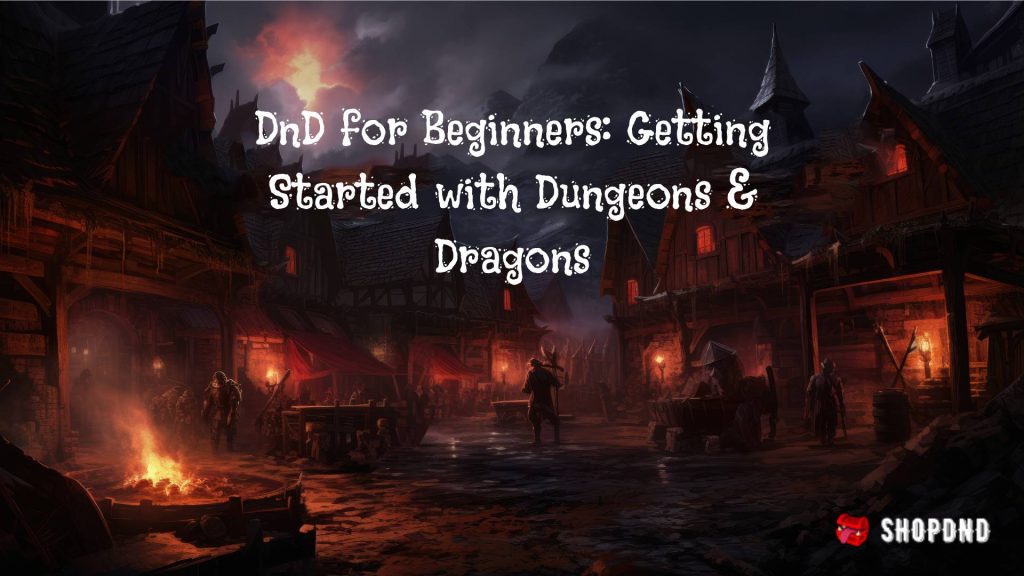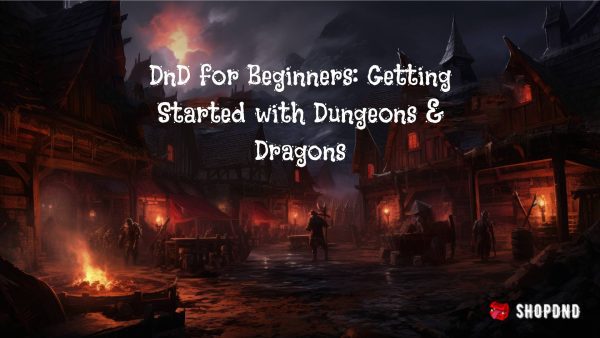
DnD for Beginners: Getting Started with Dungeons & Dragons
Ready to roll your first d20 and dive into epic storytelling? DnD for beginners can feel overwhelming when you see rulebooks, dice, and character sheets, but this guide breaks down every step so you can start playing with confidence.
You’ll discover what Dungeons and Dragons is, learn how to create your first character, master the basic rules and combat, gather essential supplies, find your adventuring party, answer common DnD questions for beginners, and even express your passion through D&D-themed apparel from Shop DND. Let’s turn that blank character sheet into the hero of your own story.
Quick Highlights - DnD for Beginners
|
What Is Dungeons & Dragons, and Why Play It?
Dungeons & Dragons is a collaborative tabletop role-playing game where players assume heroic roles in a shared fantasy narrative, using dice to resolve actions and creativity to shape the story for immersive teamwork and endless replayability. This collaborative storytelling element fosters social bonding, creative problem-solving, and a welcoming community.
What Makes D&D a Unique Tabletop Role-Playing Game
D&D stands out because it blends structured rules with limitless imagination:
- Players create custom heroes and develop them over time.
- A Dungeon Master guides the world, adapting challenges on the fly.
- Story outcomes emerge from collaborative storytelling and dice-driven mechanics.
These elements combine to create an experience where no two adventures are the same and every decision matters.
Key Roles in Dungeons and Dragons
- Dungeon Master: Designs the world, controls non-player characters, and manages the rules.
- Player Characters: Individual heroes with unique abilities, backgrounds, and motivations.
- Non-Player Characters (NPCs): Allies, villains, and bystanders who populate the adventure.
Understanding these roles helps DnD newbies know when to roll dice, role-play their character, or support their teammates.
Shaping Your D&D Experience with Storytelling
Storytelling in D&D drives player engagement by linking mechanics, like rolling a d20, to narrative stakes such as saving a village or uncovering a lost artefact. This fusion of rule and plot empowers you to shape the world with your choices, laying the groundwork for crafting your first character in the next section.
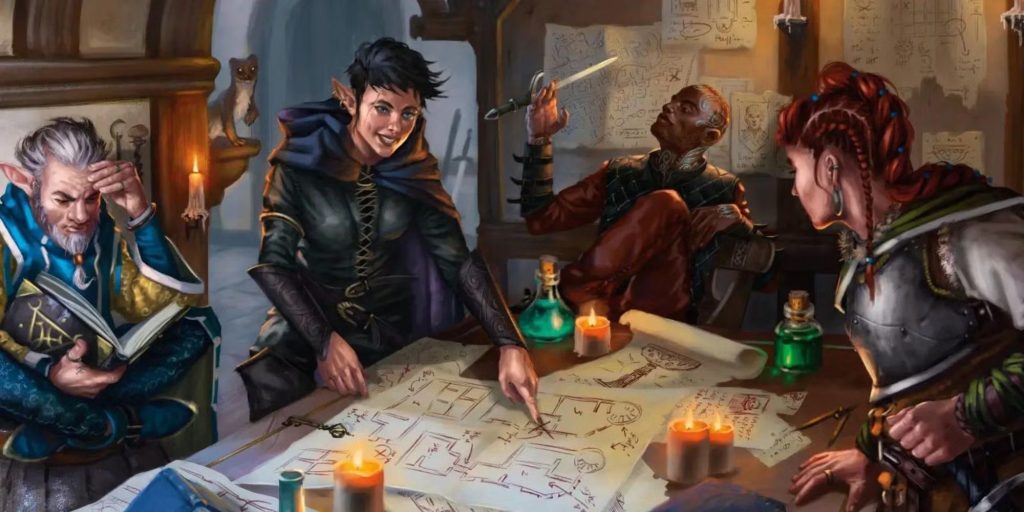
Creating Your First Character
Making your own character is a step-by-step blend of rules and storytelling. Choose your race and class carefully, assign ability scores, select a background, and define your alignment to build a unique avatar for your adventure.
Choosing Your Race and Class for Beginners
Choosing race and class defines your character’s basic traits and role in the party:
- Race (e.g., Human, Elf, Dwarf) grants ability bonuses and special traits.
- Class (e.g., Fighter, Wizard, Rogue) determines core skills, spellcasting or combat style.
- Combination benefits (like a Dwarven Fighter’s resilience) generate clear in-game roles.
Selecting a race and class you find exciting ensures both mechanical synergy and role-play enjoyment.
Assigning Ability Scores
Ability scores measure core attributes – Strength, Dexterity, Constitution, Intelligence, Wisdom, Charisma – to determine success in tasks:
|
Choosing a method that fits your group’s style balances fairness with personalisation and sets the stage for filling out your character sheet.
Filling Out a Basic Character Sheet
Begin with the essentials to bring your hero to life:
- Enter race, class, and background at the top.
- Allocate ability scores in the designated boxes.
- Calculate modifiers and record saving throws and skills.
- Note hit points, AC (Armour Class), and proficiency bonus.
- List equipment, spells, and defining personality traits.
Filling out a character sheet correctly equips you with a functional character ready for your first session.
Backgrounds and Alignments
Backgrounds and alignments frame your character’s backstory and moral compass, enhancing role-play depth and party dynamics:
| Background | Benefit | Personality Hook |
| Noble | Wealth, social connections | Upholds honour and duty |
| Outlander | Survival skills, wilderness lore | Craves freedom and exploration |
| Sage | Research network, extra languages | Pursues knowledge above all |
| Criminal | Underworld contacts, stealth | Lives by own moral code |
These choices inform motivations, dialogue, and decision-making during your adventures, building a richer narrative.
Read more about The Best DND Builds for Beginners.
Basic Rules and Combat Overview
Dungeons and Dragons uses dice rolls and turn-based combat phases – initiative, actions, and movement – to resolve encounters, ensuring fair and exciting challenges as you explore dungeons and fight foes. Hit Points, Armour Class, and Saving Throws determine survivability and resilience in battle.
Determining Actions and Outcomes Dice Rolls
Dice rolls inject chance into gameplay by matching die results against target numbers to decide success or failure:
| Dice Type | Attribute | Common Use |
| d20 | Twenty-sided polyhedral die | Attack rolls, skill checks |
| d12 | Twelve-sided polyhedral die | Weapon damage, random tables |
| d10 | Ten-sided polyhedral die | Percentage rolls (d100), spells |
| d8 | Eight-sided polyhedral die | Damage rolls, healing spells |
| d6 | Six-sided polyhedral die | Standard damage, ability checks |
| d4 | Four-sided polyhedral die | Small damage rolls, pact weapons |
The Role of Dice in Gameplay
Dice rolls are a fundamental mechanic in D&D, introducing an element of chance that influences the outcomes of actions. Different dice types are used for various purposes, such as attack rolls, skill checks, and damage calculations, adding unpredictability and excitement to combat and other challenges.
Key Combat Phases: Initiative, Actions, and Movement
Combat unfolds in a structured sequence that balances strategy with pace:
- Initiative: Determine turn order by rolling a d20 plus Dexterity modifier.
- Actions: On their turn, characters can Attack, Cast a Spell, or Use an Object.
- Movement: Move up to your speed, positioning for advantage.
Mastering these phases ensures smooth, tactical battles where positioning and timing can turn the tide.
Hit Points, Armour Class, and Saving Throws
Hit Points (HP), Armour Class (AC), and Saving Throws define survivability and resilience in encounters:
- HP tracks your character’s health and endurance.
- AC represents how hard you are to hit, based on armour and Dexterity.
- Saving Throws resist harmful effects like spells or traps.
Together, these mechanics maintain challenge balance and drive suspense as you navigate combat scenarios.
Essential Supplies for DnD Newbies
Essential supplies combine core rulebooks, dice, and character sheets so new players can jump into adventures quickly, while optional accessories and apparel enhance immersion and personal expression. Gathering the right tools sets a strong foundation for every game.
Best Rulebooks and Starter Sets for New Players
Beginners thrive with clear guidance from:
- Player’s Handbook: Complete rules, character options, and spells.
- D&D Starter Set: Introductory adventure, pre-made characters, simplified rules.
- D&D Essentials Kit: Expanded options, dice, and a screen for Dungeon Masters.
Dice Sets and Character Sheets
Having reliable dice and well-organised sheets makes gameplay smooth:
- Complete polyhedral dice set (d4–d20) in durable case.
- Double-sided printable character sheets with class features.
- Digital character builder apps for quick edits.
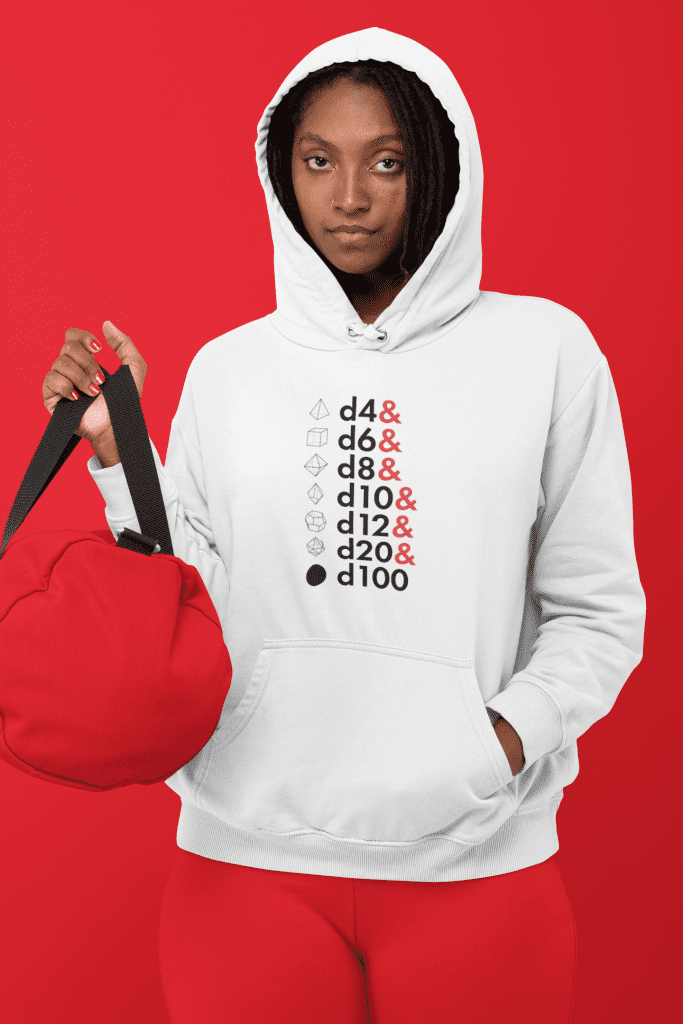
D&D-Themed Apparel to Enhance Your Gaming Experience
Wearing class- or race-inspired t-shirts and hoodies fosters immersion, builds camaraderie, and expresses your fandom. Character symbols and witty slogans spark conversation at the table while uniting players through shared passion.
For high-quality, officially inspired designs, explore Shop DND’s curated collections of:
- Class-emblem t-shirts featuring Fighter, Wizard, Rogue art.
- Cosy hoodies adorned with dragon motifs and campaign maps.
- Accessories like enamel pins, dice bags, and playmats.
These items deliver both style and functionality, ensuring you look the part in every session.
How Can Beginners Find and Join Their First D&D Group?
Connecting with fellow adventurers through online platforms and local venues empowers new players to gain experience, build friendships, and ensure regular game nights. Community engagement is key to long-term enjoyment.
What online platforms can help you connect with D&D players?
Virtual hubs streamline group formation:
- Discord servers dedicated to D&D groups and one-shots.
- Roll20 and Fantasy Grounds for integrated video-chat and maps.
- Reddit communities like r/dndnext and Facebook groups for session invites.
How do you find local gaming stores and in-person groups?
Local game shops often host weekly sessions and advertise on boards:
- Visit nearby hobby stores and ask for D&D nights.
- Check Meetup and Eventbrite for tabletop events.
- Scan community bulletin boards at libraries and cafés.
Face-to-face play fosters stronger social bonds and a tactile gaming experience.
What is “Session Zero” and why is it important for new groups?
Session Zero is a preparatory meeting where players and the Dungeon Master discuss expectations, character concepts, and house rules. Establishing these details upfront promotes a respectful, cohesive play environment and prevents misunderstandings during the campaign.
Common Questions - Getting Started with Dungeons and Dragons
Answering typical questions about DnD for beginners builds confidence and accelerates engagement with the game’s core elements, ensuring first sessions run smoothly and players feel prepared.
How do I start playing D&D for the first time?
To begin, assemble a small group (3–5 players), choose a Dungeon Master, create simple character concepts by selecting race and class, and run a short introductory adventure using a Starter Set or one-shot module.
What supplies and setup do I need to play D&D?
Every session requires a set of polyhedral dice (d4–d20), printed or digital character sheets, pencils, and at least one rulebook (Starter Set or Player’s Handbook). Optional grid maps, miniatures, and D&D-themed apparel enrich the experience.
Can I play D&D online, and how?
Yes, you can play fully online via virtual tabletops like Roll20 or Foundry Virtual Tabletop, combining integrated maps, tokens, and voice/video chat to recreate the tabletop feel remotely.
What is a Dungeon Master, and what do they do?
A Dungeon Master serves as the story’s narrator and referee, creating adventures, controlling non-player characters, adjudicating rules, and guiding the campaign’s pacing and tone.
How Can You Express Your Passion for D&D Through Apparel?
D&D apparel allows you to wear your character’s emblem or quote your favourite game moments, strengthening community ties and making every session feel like a shared celebration of fantasy.
How do I choose my first D&D T-shirt or hoodie?
Selecting your first piece involves:
- Identifying your favourite class or race artwork.
- Checking material quality (cotton-blend for breathability).
- Confirming size and fit for comfort during long sessions.
- Considering easy-care prints that resist fading.
This approach ensures satisfaction with both design and durability.
How do I care for my D&D apparel to keep it looking great?
Proper maintenance extends the life of your themed clothing:
- Turn garments inside out before washing on a gentle cycle.
- Use mild detergent and cold water to protect fabric and prints.
- Line dry or tumble dry low to prevent shrinkage.
- Store folded in a cool, dry place away from direct sunlight.
Following these steps preserves colour, print sharpness, and fit so your gear remains campaign-ready.
Did You Enjoy Your First Adventure? Get Ready for the Next One!
Whether you’re rolling your first d20 or coaching new friends through their maiden voyage, Dungeons and Dragons offers endless possibilities for creativity, friendship, and personal expression. Embrace the adventure, equip yourself with the right tools, and show off your passion through unique apparel, then let the story unfold.
Happy adventuring, and may your critical hits be epic!
